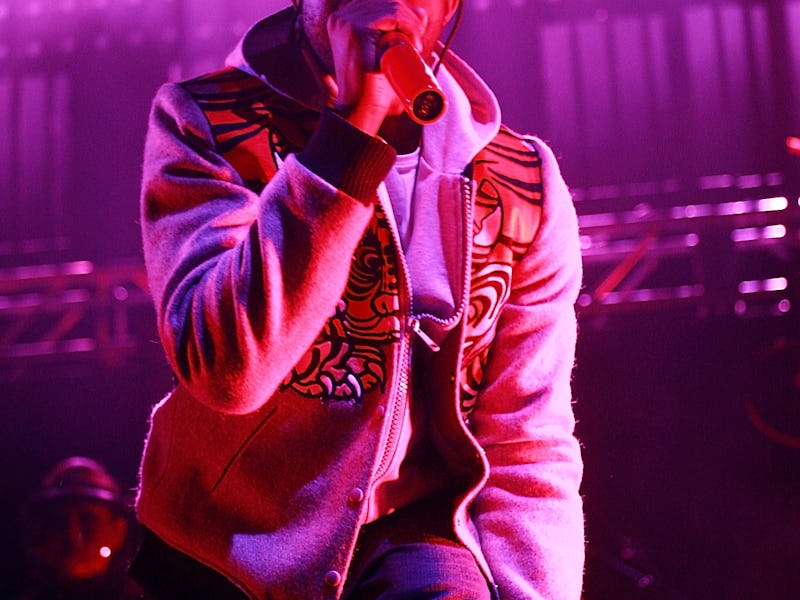Kanye West's '808s & Heartbreak:" A Weird Fluke That Changed Pop Music
As he prepares to perform it in full this Friday in L.A., we revisit Kanye's most misunderstood but culturally significant album.

Kanye West’s 808s and Heartbreak was, upon its impact almost seven years ago, an instant source of bewilderment and fascination. A down-tempo album with little in the way of sampling and more singing than rapping — processed through T-Pain’s maligned Autotune patch at that — 808s was perceived as Kanye going “emo” in the wake of the death of his mother and the dissolution of his relationship with Alexis Phifer. Detractors thought Kanye was on the verge of insanity or washed-ness; he’d let the massive success of his previous experiments go to his head, and thought an album he’d lobbed off in two months on vacation would be regarded as an instant masterpiece. Faithful Kanye devotees who didn’t like 808s prayed that it was a one-off experiment, and many others had to take a little time to let its unique pleasures settle in.
In hindsight, the album seems like a logical extension of Kanye’s pre-existing interest — on Graduation, most dramatically — in synthesizing pop, indie pop/rock and hip-hop trends. Over time, it’s proved itself to be much more than a fluke, anticipating and influencing the direction popular music would take in the following years. On Friday night, Kanye is revisiting the album by performing it in its entirety at the Hollywood Bowl, for two nights — presumably, he’s also aware and proud of its continuing significance.
The influence of Kanye’s melodic, melancholic sound on the record has been noted in regards to the career of successors like Kid Cudi and the man who’s by now seemingly sublimated everything that originally made him what he is: Drake. 808s can also be reasonably credited with proliferating trends toward an unabashedly ‘80s-pop-influenced sound in rap and pop production, expanding on a wave that was on the rise already in indie music. In a 2008 MTV interview, Kanye specified that he was tapping into an interest in auteurs from that decade, from Gary Numan to Sting to Phil Collins, as well as musically paying tribute to “minimal and functional” architecture, one of his interests at the time. He called the sparse opener “Say You Will” one of “his favorite tracks he’s ever done”: Propelled by cold atonal bleeping evoking an EKG machine, and faint, haunting synth pads, it feels like a tribute to the exposition of Phil Collins’ 1981 hit “In the Air Tonight,” one of the moodiest drum-machine-driven classics in the history of pop.
On 808s, Kanye also solidified the working methodology for his subsequent albums, one he had been building up to on previous releases. Instead of just sampling sounds he liked, Kanye would bring in collaborators to assist him in realizing the textures in which he was interested. Kanye’s interest in making Roland TR-808 drum machines and vintage synths the bulwark of this album was also thanks to Jon Brion — indie-pop artist, film composer extraordinaire, and co-producer of Late Registration and Graduation — who showed ‘Ye around the technology. Most importantly, T-Pain, the first rapper to popularize Autotune, worked with Kanye in Hawaii, helping him teaching him how use the effect correctly.
808s is often considered the first release to successfully present Autotune as a “legitimate” instrument as opposed to a gimmick. T-Pain is the under-appreciated progenitor, but Kanye improved the technique’s reputation. Around this time, Lil Wayne — who was at the apex of his popularity — was using it frequently. Between his warbling experiments and Kanye’s more structured, melodically well-chiseled ones, many artists who found T-Pain’s work too circus-y found something to like and imitate.
I would guess that only a small fraction of longtime Kanye fans would be comfortable calling 808s their favorite of his albums, as it still stands alone, stylistically, in his catalog. To call 808s his best, perhaps, is to signal that you don’t really like Kanye in the macro, or don’t appreciate the ways in which his formative soul-sample-heavy production style changed the sound of hip-hop. But if you’re the right age, the anomalous 808s was the one you hopped in on, and means the most to you, and you rightfully don’t care what people think. After all, it was a No. 1 album with four singles, two of which remain among the highest charting of his career. It was as culturally impactful as any of his previous records, and is more than worth considering among his greatest work.
Why is Kanye revisiting 808s now, with this show? It’s likely we won’t know until we see the YouTubes of Kanye’s onstage comments. But he does seem to have adopted a 808s-like M.O. on his newer work: Even with Yeezus, tracks like “Only One” and “Wolves” veer the farthest away from “rap” music he has ventured since 808s. Would Kanye be doing this music today had he not taken the big step out he took with the album — without deciding to pour his emotions out in whatever way he felt like? With 808s and Heartbreak, Kanye opened his eyes, and the rest of the world’s, to the far-flung things of which he was capable, and unleashed in earnest the bigger-than-life, splayed-all-over-the-place, force-of-nature Kanye we are still grappling with today.